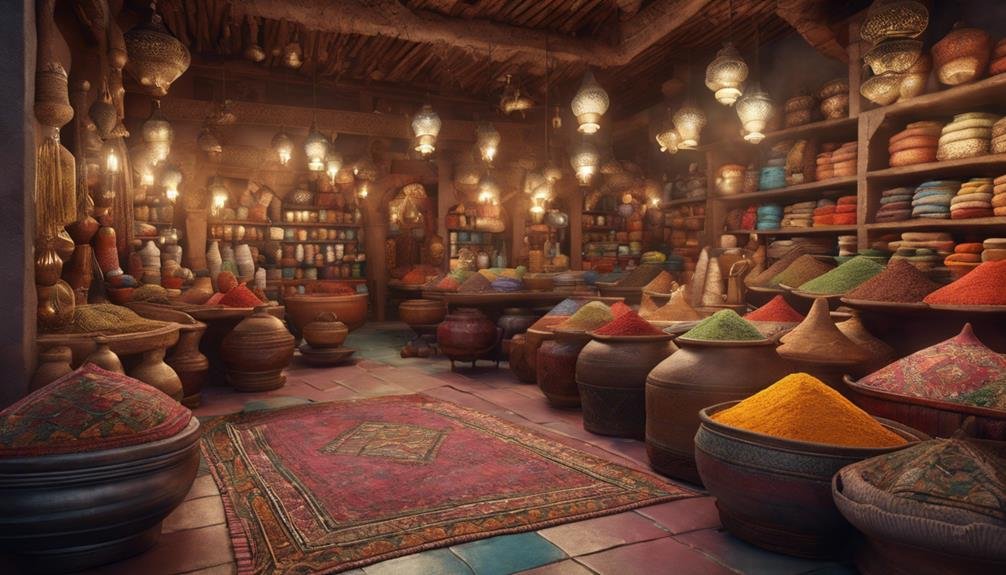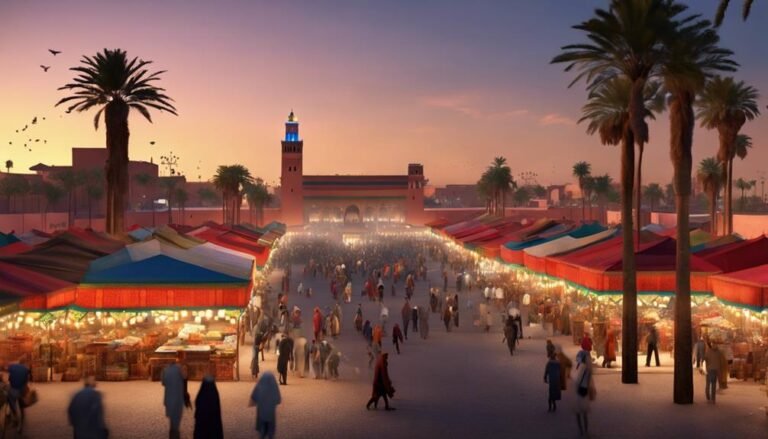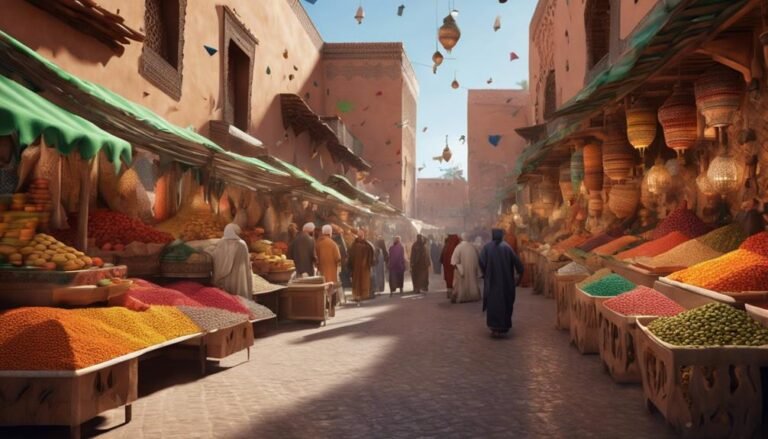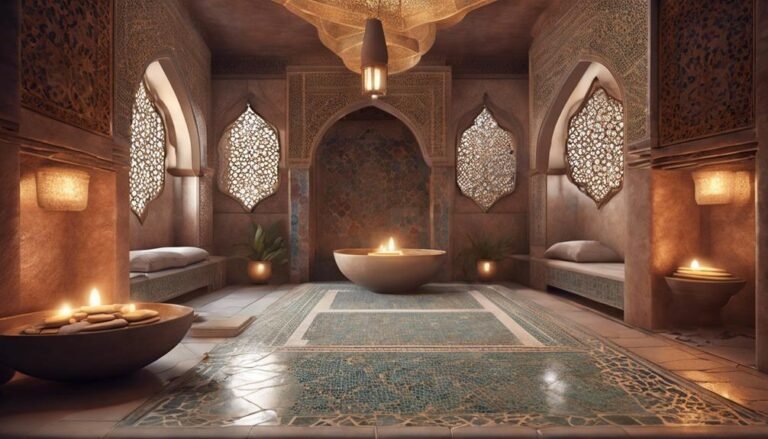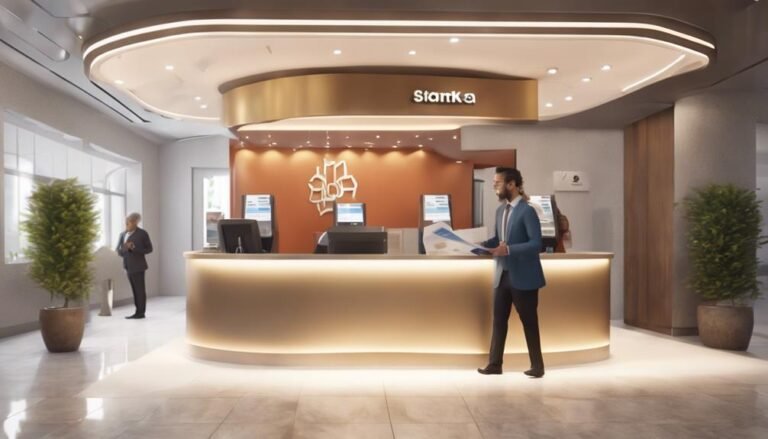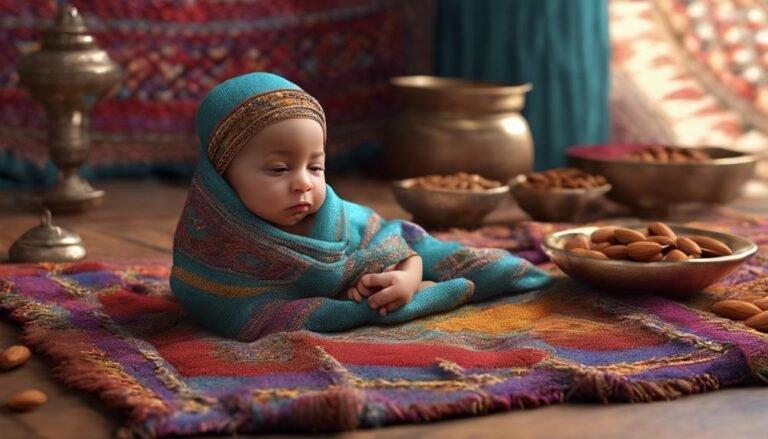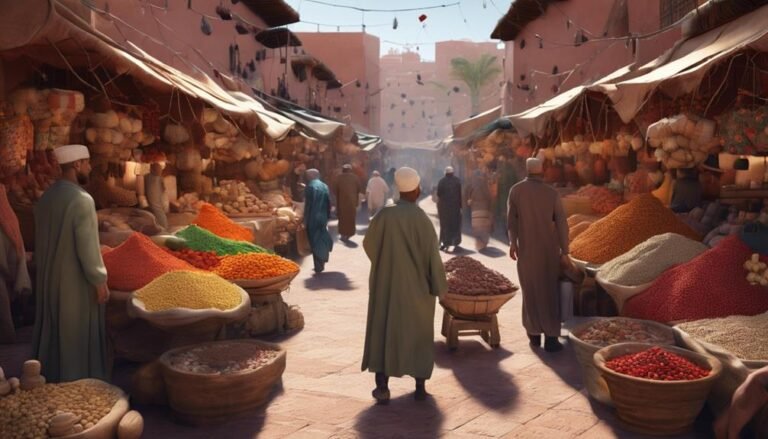Immerse yourself in Moroccan customs and traditions. Festivals are vibrant, with music and dance at the core, reflecting the country's rich diversity. Religious holidays like Eid bring communities together. Social etiquette values respect, hospitality, and small gifts for hosts. Traditional attire showcases a mix of Berber, Arab, and African influences. Culinary delights feature couscous, tagine, and communal dining emphasizing unity. Marriage customs blend religious and cultural practices, with weddings filled with music and feasts. Discover the tapestry of Moroccan culture, steeped in history, and fostering strong community bonds.
Key Takeaways
- Festivals showcase diverse Moroccan heritage through music and dance.
- Greetings include handshakes, cheek kisses, and respect for elders.
- Traditional attire like djellaba and kaftan represent cultural pride.
- Moroccan hospitality features warm welcomes with mint tea and snacks.
- Marriage customs blend religious rituals with vibrant celebrations.
Festivals and Celebrations
Have you ever wondered about the vibrant festivals and celebrations that are an integral part of Moroccan customs and traditions? In Morocco, music and dance play a central role in various cultural celebrations, reflecting the rich diversity and heritage of the country. These festivities aren't merely forms of entertainment but are deeply rooted in the cultural significance of Morocco.
Religious holidays are particularly important in Moroccan traditions, serving as occasions for community gatherings and spiritual reflection. During religious festivals such as Eid al-Fitr and Eid al-Adha, the streets come alive with colorful processions, traditional music, and joyful dances. These celebrations bring together families and communities, strengthening social bonds and fostering a sense of unity among the people.
Whether it's the rhythmic beats of traditional music at a local festival or the spirited dances during religious holidays, Moroccan festivals and celebrations offer a glimpse into the heart of the country's customs and traditions. The passion and enthusiasm displayed during these events underscore the deep-rooted cultural pride that Moroccans hold dear.
Social Etiquette and Hospitality
Social etiquette and hospitality in Morocco are deeply ingrained in daily interactions, reflecting the cultural values and traditions of the country. Greeting customs are important in Moroccan society, with individuals typically greeting each other with handshakes and sometimes cheek kisses among people of the same gender. It is common to inquire about one's well-being and family before getting into any business or personal discussions. Cultural norms dictate a high level of respect for elders, so addressing them with proper titles and showing deference is essential.
When it comes to hosting etiquette, Moroccans are known for their warm hospitality. Guests are often welcomed with mint tea and snacks, and it is customary to accept these offerings as a sign of respect. In return, guests are expected to show appreciation and politeness towards their hosts. Guest expectations include being gracious and expressing gratitude for the hospitality received. It is also common for guests to bring small gifts as a token of appreciation for the host's generosity.
| Greeting Customs | Cultural Norms | Hosting Etiquette |
|---|---|---|
| Handshakes and kisses | Respect for elders | Warm hospitality |
| Inquiring about well-being | Addressing elders with respect | Offering mint tea |
| Showing deference | Proper titles for elders | Accepting offerings |
Traditional Clothing and Attire
What role do traditional clothing and attire play in Moroccan culture and society?
Traditional Moroccan clothing holds deep cultural significance and reflects the country's diverse history. The fashion trends in Morocco have been influenced by various factors, including Berber, Arab, and African traditions, resulting in a rich tapestry of styles and designs.
The historical evolution of Moroccan attire showcases a blend of intricate embroidery, vibrant colors, and luxurious fabrics. Each region in Morocco has its unique traditional dress, such as the djellaba, kaftan, and the fez hat. These garments aren't only a form of self-expression but also symbolize cultural heritage and pride.
In modern times, traditional Moroccan clothing has seen various adaptations to suit contemporary lifestyles and preferences. While many Moroccans still wear traditional attire for special occasions and cultural celebrations, everyday wear has become more influenced by Western fashion trends.
Culinary Delights and Dining Customs
Traditional Moroccan clothing serves as a vibrant reflection of the country's diverse history, and similarly, Moroccan culinary delights and dining customs offer a flavorful glimpse into the rich tapestry of Moroccan culture. Moroccan cuisine is a delightful mix of Arab, Berber, and Mediterranean influences, resulting in a unique and savory experience for your taste buds. The traditional recipes passed down through generations are a tribute to Morocco's culinary heritage, with dishes like couscous, tagine, and pastilla being staples in Moroccan households.
When it comes to dining etiquette, Moroccans place great emphasis on hospitality and communal dining. Meals are often shared from a central dish, symbolizing unity and togetherness. Cooking traditions in Morocco involve careful meal preparation, with spices like cumin, cinnamon, and saffron being essential ingredients that add depth and complexity to the dishes.
To give you a better insight into Moroccan culinary culture, here is a table showcasing some popular Moroccan dishes:
| Dish | Description | Ingredients |
|---|---|---|
| Couscous | Steamed semolina granules | Vegetables, meat, chickpeas |
| Tagine | Slow-cooked stew | Meat, vegetables, dried fruits |
| Pastilla | Savory meat pie | Phyllo dough, pigeon or chicken |
Marriage and Family Traditions
How do Moroccan marriage and family traditions reflect the cultural values of unity and heritage?
Moroccan marriage customs are deeply rooted in tradition, often involving intricate ceremonies that blend religious and cultural practices. Wedding rituals vary across regions but typically include vibrant celebrations, traditional music, and elaborate feasts. Family roles are clearly defined, with an emphasis on respect for elders and the importance of extended family connections.
In terms of family traditions, inheritance customs play a significant role in Moroccan society, with laws governing the distribution of assets among family members. Childrearing practices emphasize the values of discipline, respect, and close family bonds. Parents are seen as the primary educators of children, teaching them cultural traditions and values from a young age.
Conclusion
To sum up, Moroccan customs and traditions are deeply rooted in their rich history and cultural heritage. From vibrant festivals to elaborate wedding ceremonies, Moroccans take pride in their social etiquette, traditional clothing, delicious cuisine, and strong family values.
By embracing these customs, they continue to preserve and pass down their unique way of life from generation to generation. Explore the diverse and colorful world of Morocco and immerse yourself in its fascinating customs and traditions.

The Editorial Team is a passionate group of Morocco enthusiasts dedicated to sharing the beauty, culture, and wonders of this captivating country. With diverse backgrounds and a deep love for travel, we strive to bring you engaging and informative content that inspires your Moroccan adventures. From uncovering hidden gems and sharing local insights to exploring mouthwatering cuisine and showcasing the vibrant lifestyle, our team is committed to providing you with valuable resources and exciting stories that enhance your exploration of Morocco. Join us on this journey as we celebrate the rich heritage and unforgettable experiences that make Morocco truly special.

